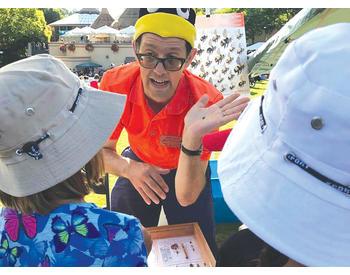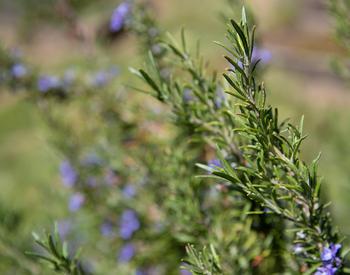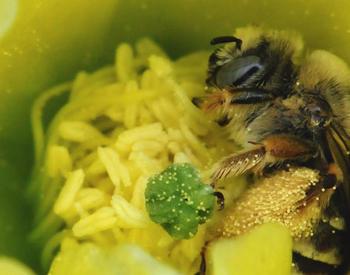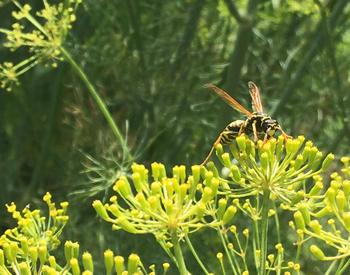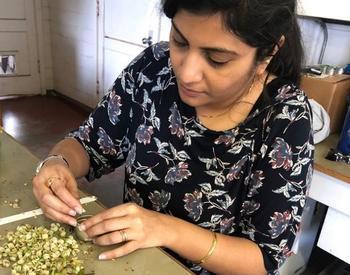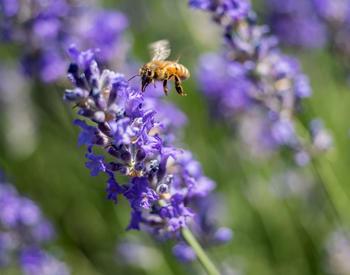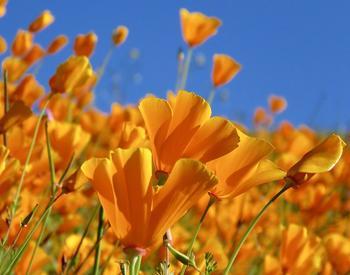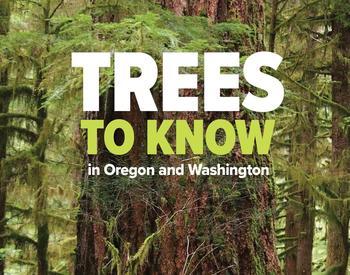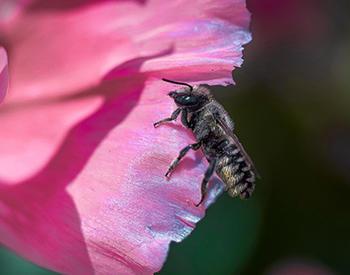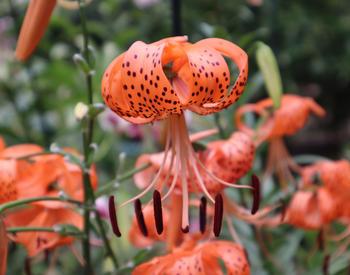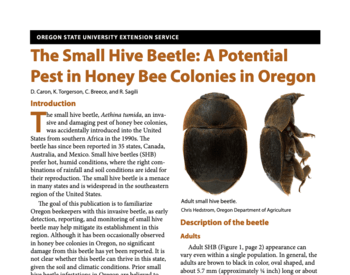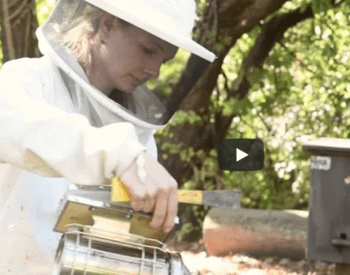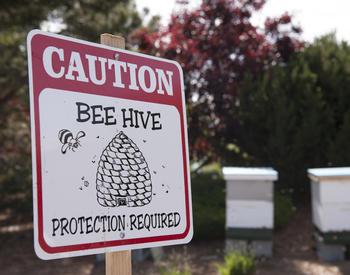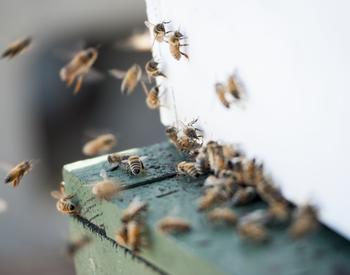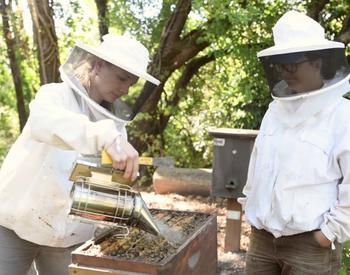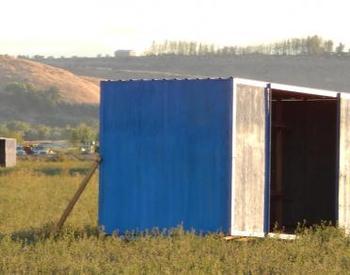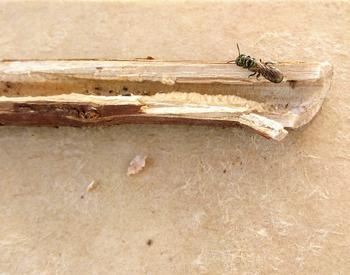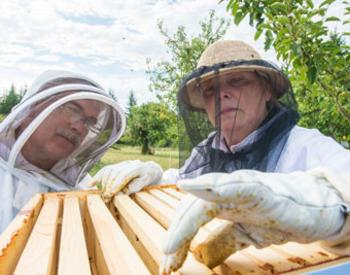Transcript
Andony Melathopoulos: [00:00:00] From the Oregon State University Extension Service. This is PolliNation, a podcast that tells the stories of researchers, land managers, and concerned citizens making bold strides to improve the health of pollinators. I'm your host, Dr. Andony Melathopoulos, Assistant Professor in Pollinator Health in the Department of Horticulture.
It is sort of a scandal that it's taken so long to get my next guest on this show. After all, her office is just a few doors down from mine. Carolyn Breece is really well known in Oregon. She is a Research Assistant at the OSU honeybee lab, and she's been there from the very start when Dr. Sagili started the program up. She's the founding Program Director of the Oregon Master Beekeeping Program, and she's taught and mentored hundreds of beekeepers here in Oregon.
Now, a couple of years ago, we shared the stage at the Oregon Coast Honey Lover's Festival in Yachats, and Carolyn laid out for the audience, this question of whether you should become a beekeeper or not, and what's involved with becoming a beekeeper; the very first questions that I think many people don't ask. I've been wanting to have her reprise that talk here on PolliNation and we're really fortunate; I finally was able to track her down, she's very busy, to share these perspectives with you. Also, I should mention, since we're talking about Yachats: the Oregon Coast Honey Lover's Festival is happening again. It's going to be May 10th this year, and also if you have not got tickets, do it soon.
Beevent is this upcoming weekend. It's Saturday, March 7th in Albany, Oregon. It's the biggest pollinator conference, annual pollinator conference that happens in the Pacific Northwest. We're going to be there. I want to talk to you; I want to meet you. Come on out. Just go to the show notes and you'll get the registration details there.
All right, so spring is upon us. I saw outside, we have a little blooming Rosemary, and the crocuses are up, and so a lot of people are dreaming about having their own honeybee colonies. I just know; I can see it on Facebook and Twitter. It's like, I need to get a bee colony. Can you tell us a little bit about how someone might decide whether to take the plunge to get into beekeeping?
Carolyn Breece: [00:02:38] Yes. Well, there are so many reasons for keeping bees. It's becoming increasingly popular, and I think that the more people do it, the more others see themselves being able to do it. It's no longer something to be afraid of. The more we know about pollinators, it seems that people think they're important and they want to support pollinators.
There's the honey aspect. People really like the honey: being able to eat it, being able to sell it, wax candles, and so on. My favorite reason for keeping bees is that they're a fascinating social creature and there's so much to learn about them, how they communicate, they dance, they have pheromones.
There's just so much to learn and watch, and so I like to just watch my bees doing what they do in my backyard. And some people just have bees in their backyard just simply for the joy of it. It's charming to have in their yard, and it may be pollinating their fruit trees or vegetables in their gardens.
Andony Melathopoulos: [00:03:46] It's funny; I was just, I was out in Ontario and I was talking with Ron Bittner, who keeps wine grapes in Boise, and he said he had bee colonies just for that. He just, he didn't manage them. He never took honey off them. He just had them in the backyard, just loved having bee colonies, just knowing that they were there. There's a variety of reasons I imagine that many people have them.
Carolyn Breece: [00:04:11] It makes people feel really good; I guess, it seems like they're part of an ecosystem and it makes the, the farm or yard a little more complete.
Andony Melathopoulos: [00:04:24] Well, and I remember, you probably can remember, the first time you went out beekeeping, there was something about holding a whole bunch of insects, and learning how to handle it. Like, you just, it really does take a little bit of like-mindfulness that you don't have a lot of opportunities to do. I can't think of like another activity that really puts you in a zone quite like beekeeping.
Carolyn Breece: [00:04:48] Yeah, absolutely. It forces you to be quiet, and calm, and if you are nervous or if you're stressed out, the bees will let you know. So it is a really nice activity to do. There's a lot of reasons to do it for sure.
Andony Melathopoulos: [00:05:07] Okay. So, but I imagine with that, that comes a lot of reasons why maybe not to do it though. We've gone through a list of positives, a wide array of positives, but why if you're sitting there looking at the crocuses and you saw your influencing neighbor next door; they just got a bee colony. What kind of things do you need to sober yourself with?
Carolyn Breece: [00:05:28] Well, I have a list of three reasons why you may not want to keep bees. The first reason is time. It takes a lot of time. These days it's no longer your grandfather's days where you can keep bees in your backyard and not look at them until it's time to harvest honey; they need constant management and there's Varroa mites, there are diseases, they need to be checked for queenlessness, just overall wellbeing. It takes a lot of time. It takes time also to stay educated. So going to classes, going to bee clubs, reading, and so on. So, it just takes time, and I think people underestimate that a lot.
Andony Melathopoulos: [00:06:10] I know you guys have done some work with little flow hives and one of the master beekeepers had a little thing; I remember the marketing for the flow hives originally. It was just like, you go out, you turn the spigot on and with your pancake in hand, and it's like you walk away. So, it takes time, so that's the first thing.
Carolyn Breece: [00:06:30] And it takes money. The startup costs are really high. You have to buy all of your wooden ware and the bees themselves, medications, feed, and so on. So, it takes a lot of money, but then to keep them going, you may need to requeen, you need your mite treatments, and feed all the time.
Andony Melathopoulos: [00:06:50] What are you're talking, about 50 bucks?
Carolyn Breece: [00:06:52] No. The startup I calculated, if you wanted to start with, I think I calculated two colonies with everything: suit, smoker, all the equipment, it's about $700, and to maintain it, I would allow for a couple of hundred dollars a year as well. So that's the startup for one or two hives. Sometimes people really like to get going big time and go start with 10 or more than that. So it's going to take a lot of money.
Number three is sleepless nights; there's a lot of anxiety in beekeeping. You are their keeper, and so you need to keep them queenright. You need to keep them fed if there's not enough. You need to keep the Varroa mites down. There's a lot of anxiety involved, so that's hard.
Andony Melathopoulos: [00:07:51] Okay. So there's these three reasons; let's just go over them again. There is the expense of it. There's going to be this time thing. And then, the third one is that you are... We had Kim Flottum on a previous episode and he has that magazine, the first three years of beekeeping... that there is a little bit of risk involved. It's not as though you just pour the bees into the box and then it's a successful venture, but there's a way in which you're going to have to deal with some frustration of getting started; it's not going to be a straight forward process.
Carolyn Breece: [00:08:27] Right. And, in the beginning, a lot of new beekeepers lose colonies. It happens to everybody. Every beekeeper loses a colony. But there's that devastating feeling, the pit of your stomach feeling that you get. And it's really hard, but it's very common and it's just something to learn from. There is that risk involved and it's hard.
Andony Melathopoulos: [00:08:51] Well, you were part of the start of the, you're still involved with the Master Beekeeper Program, but you were the, the sort of the initial Coordinator for the program. So you've seen a lot of beginners start beekeeping. Tell us about some of the things that people typically underestimate. You've seen a lot of people go through this process of excitement, and then actually kind of putting the money down, and the sleepless nights. What, what's some of the key things that they underestimate?
Carolyn Breece: [00:09:22] I think people underestimate the impact of Varroa mites. I think that's number one. It's a introduced pest on an introduced bee. The honeybee hasn't had a lot of time to evolve with this pest. It spreads viruses and, there's just so many; they can explode in population before you know it. Even in one month you can have a low population, and then two weeks later, it explodes beyond the threshold levels.
I think a lot of times people will treat, and think that they're done, but there can be Varroa from the environment, from other bees that people keep, like their neighbors. I think that's probably the biggest underestimating factor: Varroa.
Andony Melathopoulos: [00:10:20] And we should mention that we've had some previous episodes, one with Ellen Topitzhofer, and also a couple with Dr. Ramesh Sagili on Varroa mites, so really encourage listeners to get a better understanding of this mite, because it sounds like this is a pretty complex pest problem to deal with.
Carolyn Breece: [00:10:41] It is, and it just doesn't seem to be going away. It seems to be getting worse as time goes on. And, it's a real downer, but if we keep on it with education and treatment and monitoring... monitoring is another another underestimating thing that beekeepers do. We have to constantly know how many mites are in our colonies, because then we can do something about it. If we don't know and they die, we will never know what happened.
Andony Melathopoulos: [00:11:11] Oh, and just to give people a sense of this, we will also have a link in the show notes. OSU has a really, which you sort of narrate, a great video on how to monitor for Varroa mites. If you're your started on the front end, and you're like, what does this monitoring actually entail, you can actually visualize it in this video.
Carolyn Breece: [00:11:29] Yeah, I have other resources too, that would be helpful.
Andony Melathopoulos: [00:11:32] Okay. Well, just keep dropping the resources as we go along and when you come to the show notes, we'll both connect you to the apiculture lab, the honeybee lab here at OSU, but also give you some other resources.
Okay, other other things that people underestimate apart from Varroa?
Carolyn Breece: [00:11:50] Ummm.
Andony Melathopoulos: [00:11:54] Okay. They underestimate Varroa. That's awesome. Okay, one thing that I think people underestimate is... this is the classic thing that I've often observed, is that people start with the honey label; they design their honey label and they have this whole thing like it's like they think they're going to have gobs of honey and they build a business model around it and then they kind of disappointed because actually getting the colonies, especially when you're starting a new operation up, it's like, oh... a couple die, you've got to draw it out of this comb; it's a very slow process to actually getting the honey that you promised your spouse you're going to pay for all this equipment with.
Carolyn Breece: [00:12:38] Yeah, that's true. Okay. Yes. So if one of your goals is to produce enough honey to sell, it takes time. You do, you have to build up your colonies and they have to be very strong just in time for the nectar bloom. It does take time, and in the Pacific Northwest, we just don't make a lot of honey here. Right. It takes patience, but the honey is delicious. So, if you are patient and you can get your colonies ready, and just time it perfectly, then, then yes, you can make honey.
Andony Melathopoulos: [00:13:17] I have to say though as well: the OSU apiculture lab has a beautiful new honey label, the Beaver classic label. There's something about making a honey label that is very rewarding. I love coming up with a name and a color and a scheme and everything.
Carolyn Breece: [00:13:33] Yeah. It's a product of all of your hard work and your bees' hard work. It does feel really good to have a nice label and a beautiful jar with clear honey.
Andony Melathopoulos: [00:13:47] You know, I would think another thing that would be very hard for people is that you come into the world and there's a lot of opinions. Like figuring out what to do, it's not like the joy of cooking where you want a chicken recipe and it's like, here it is: this is how you make a chicken. It's like, you end up kind of barraged by a whole lot of ideas.
Carolyn Breece: [00:14:08] Yeah, that's true.T o me, now that I've had a lot of experience with beekeeping, I think that's the fun part. It is fun. That's true. Because there are so many different ways to keep bees.
There's a lot of different ways to manipulate them based on your goals. But for a beginner, it can be overwhelming and it's hard to go to a bee club meeting and listen to a speaker, but then have your own mentor say something different. It's hard to juggle all of that. Part of the Master Beekeeper Program is to have a guide to present science-based management and techniques for beekeepers. Of course, there will still be all kinds of different ways to do things, but part of that program just helps to kind of weed out all the different ways of keeping bees that you may find on YouTube or, you know, it's really huge out there what you can find. Just hearing some tried and true methods is useful for people.
Andony Melathopoulos: [00:15:20] Well, just recalling an earlier conversation we had with Jen Holt on a previous episode about mentors and that's one thing about the Oregon Master Beekeepers: a unique feature of it is that in some ways, you do need at least one central person to, when you're confronted with all of this, at least one person who's like, okay, this is my coherent beekeeping vision.
Carolyn Breece: [00:15:50] Yeah, and those mentors have been through the program and so they are trained, they know what works and what doesn't, so you can trust that beekeeper, the mentor. So it is a good idea.
Andony Melathopoulos: [00:16:04] Okay. Let's take a quick break and we'll come back and we'll get more into the nitty gritty of what's entailed with getting started.
Okay. We are back. One of the things that we talked about was some of the rewards of beekeeping and there's a few of them, but I imagine, as you go on,that there's these immediate rewards that you get back, but talk a little bit more about when you do get into beekeeping, some of the things that sort of emerge, that sort of become a lifelong pursuit.
Carolyn Breece: [00:16:49] Okay. So pollination and honey are the obvious rewards and those are really nice rewards for beekeeping, but what I have found over the years is, that you can develop a real community and friendship with other beekeepers. Beekeeping can easily form into an obsession, and I've found that amongst beekeepers, they're, um, they're a pretty eccentric group.
You can have long discussions long into the night about how to do something this way or that, or what the newest research in this particular disease or pesticide is, or, you know, it's, there's just so much to talk about and you can really form some neat friendships that way. Friendships and just simply community by going to these bee clubs, talking about bees with your neighbors, farmer's markets, just outreach. People are very interested in bees and you can talk for hours and hours. So, it's just a community builder. It just is a real obsession, and you will find yourself absolutely in love, and puzzling over them at all times. I think those are rewards.
Andony Melathopoulos: [00:18:20] We had a sociologist on one of the episodes who studied bee clubs. It was fascinating episode. I can't remember her name right off hand. We'll put it in the show notes.
There's not a lot of opportunities. You know, you have social media and these sort of virtual, but there's not a lot of opportunities to get together on a monthly basis with a bunch of people who are completely different from you, and a bee club is really one of those spots where you can run into a host of different people and you have this common pursuit, and you can connect on it.
Carolyn Breece: [00:19:00] Absolutely. Yeah. It's really fun.
Andony Melathopoulos: [00:19:02] And there's a lot of bee clubs in the state too, so if you don't, if you're new to bebkeeping, go to the Oregon State Beekeepers Association meetings. I think the clubs are all listed there.
Carolyn Breece: [00:19:10] Yes. Yeah. Lots of clubs, lots of new ones. And, I've even been to clubs where they have a potluck, every single club. I thought that was the greatest idea. It brings people together and people make these elaborate dishes and you're just amongst people with a common bond of bees. But like you said, they can be from any background.
Andony Melathopoulos: [00:19:35] Right. Fantastic. Well, I guess we've been talking about the the pros and cons of beekeeping, but let's say somebody does do the ledger and they listen to this episode and say I don't think I have the time, I certainly don't have the resources, and I want to sleep at night. What else can I do for bees?
Carolyn Breece: [00:19:55] Well, you can keep bees by planting flowers for them. So bees of all types: native bees, honey bees, they all need forage more than ever. And if you plant these flowering nectar-producing, pollen-producing plants in your yard, you are keeping bees because you're feeding them. And they're amazing, beautiful bees of all types that if anyone's part of the Oregon Bee Project, they'll know. It's just really neat to see the diversity that comes to your yard if the flowers are there. If you are interested in pollination, earnestly for your flower and plants or your vegetable garden, then consider Mason bees. They're a little more hands off but they do the job. Those are great options for keeping bees without the huge time and money investment of honeybees.
Andony Melathopoulos: [00:20:57] You know, I don't know that people really quite realize how the differential of work is between Mason bees and honeybees. If you're coming in from the beginning, it's like, oh, they're both bees, you have to keep them, they both have a house, but really the Mason bee is spending like 80% of its life in a tube and it's asleep, or in some other diapause or eating something. Here, honeybees are perennial; they lived through the season, they need intervention at every step. It's a real different time commitment.
Carolyn Breece: [00:21:31] It is for sure. And, you know, people say that honey bees have been surviving without a management since the beginning. That's true to an extent, but now that we have these introduced pests and diseases, it's a different story. So they do require a lot more care by the beekeeper than they had in the past.
Andony Melathopoulos: [00:21:56] I'll have to tell you something though, as great as Mason bees are, the sense of comradery... so Beevent is coming up. Beevent I think is going to be probably after this recording, or it might be just, it might be folks coming up this week, so if you haven't got your tickets, go to Beevent. We do have these kinds of events like that, but there's something about the bee clubs and that kind of social: "oh, have you tried this method? Have you tried cut comb? Have you tried...?" It's kind of like more like a knitting circle than Mason bees are. They are solitary bees, so they do kind of, you know, they don't need anybody.
Carolyn Breece: [00:22:38] Yeah. Right. And. I like to tell people about Mason bees, and that's something that they should try if they're not interested in honeybees, but they are a little anticlimactic, I think, because they do their big activity for just a few weeks and then it's over.
Andony Melathopoulos: [00:22:55] But I imagine maybe at some of these Mason bee things it's like, do you have moisture in your fridge? Or not? Not quite the same as like, you know, do you run eight frames or 10 frames? All right. So let's say you're, going to take a plunge. You've listened to our pros and cons here and you're going to take the plunge. What are the first steps to take to get started, to get rolling? How do you even start to become a beekeeper?
Carolyn Breece: [00:23:27] First is to join a bee club. Like we were talking about; they are rooms full of people with decades of experience and they all like to share their experience. Beekeepers really talk. They want to help you. So, join a bee club and read exhaustively. There's all kinds of books out there that are excellent guides on how to keep bees. And if you read everything you can in the winter, then you'll be really prepared in the spring when it's time to start with bees.
So, read, join a club. Once you are ready, your bees are on order, your equipment's ready.
Andony Melathopoulos: [00:24:06] Wait a second, your bees are on order? What does that mean?
Carolyn Breece: [00:24:09] You have committed and you have contacted the beekeeping supply store and you have ordered a box of bees, either in a screen box full of adult bees or a miniature hive, which is called a nuc. You can choose either of those.
Andony Melathopoulos: [00:24:25] And, sorry to throw you off, but when do you need to do that? Let's say you're hoping this year, can you just call somebody up tomorrow and get some bees.
Carolyn Breece: [00:24:37] So it's late February now; you may be able to find some suppliers that still have bees available, but they sell out quickly. I'm not sure how things are right now, but you want to order in the winter. The bees will arrive in spring, so April or May. After that, it's going to be a lot harder to find bees, so you want to start everything in spring.
Andony Melathopoulos: [00:25:00] I remember there are some great opportunities. If you're a listener in Portland, for example, Portland Metro Beekeepers have this nice event where they do a little bit of training, but they also work with the supplier so you can walk away with your bees after a little bit of training.
Carolyn Breece: [00:25:15] Yes, that's ideal. And, that's a really great event because you are surrounding a hive with an experienced beekeeper, and that beekeeper is showing you exactly what to look for, what's healthy, what's not, what Varroa mites look like, how to monitor. So, you really get that hands-on experience before you take away your bees.
Andony Melathopoulos: [00:25:38] Oh. And also there's Glory Bee when they're giving out packages. There's also an educational event connected with it down in Eugene. Okay, sorry, threw you off. So you've got to get the bees, get them on order, they're on their way, and then what? Then what's next? What are you doing then?
Carolyn Breece: [00:25:54] You have a little bit of time still, so you're kind of waiting for your bees to arrive. That's a great time to sign up for Bee School. A lot of bee clubs have a one or two day bee school where everybody just comes, you get a book, and you learn everything you can. Bee schools are excellent, although it's a lot of information to take in, in one or two days. So an alternative, a great alternative is the Oregon Master Beekeeper Program. That's a longterm educational program where you have a class every month. You get matched up with a mentor and it's more of a longterm education, which this hobby is a longterm hobby, so it's something to really consider and commit to.
So, sign up for some kind of educational program. Then your bees will arrive. Wait, let me back up. If you don't sign up for the Oregon Master Beekeeper Program, then find yourself a mentor some other way, maybe through bee club. Maybe your neighbor keeps bees, but find somebody that can guide you hands-on in a hive so you know exactly what you're looking at. Cause it's, it's different than reading from a book. Things are... you might not know what you're looking at based on what you've read, so a mentor really can help with that. Find a mentor and then just go.
Get your bees, put them in the hive, and you know, make sure they have what they need and don't stress too much. There are some great checklists on the Oregon State Beekeepers Association website that has a list of all the things you should do during a particular month. So, there's a great checklist. So, you can be guided through, and the important thing is just to start and ask questions if you need them, but also don't forget to experience the joy of it. I think sometimes we get really wrapped up in the education part and doing things right, and then we miss out on the magic of it.
Andony Melathopoulos: [00:28:08] Absolutely. Yeah. Okay. That's great. And so I think getting up and getting started, and then you're off to the races and the one thought I had on that was that bee clubs are really the place to find mentors, and it's a little daunting because you're starting something new. I'm starting to take dance lessons. Never danced in my life. I'm a little terrified and I'm kind of reluctant to ask questions cause it's like I don't know anything. But I mean, going into a bee club and saying, "I'm a new beekeeper, I'm looking for a mentor and I'm flexible," or something like that, that's a great opportunity to find somebody brand new and have them take you under their wing.
Carolyn Breece: [00:28:43] And beekeepers love to do that; they love to help others out. It's part of the scene. It's just a great thing to do.
Andony Melathopoulos: [00:28:51] Okay. So I guess. You're up and running and I'm sure we've mentioned that people have all sorts of interests in bees and we've got some great examples. I was thinking there's that episode that we have with Bee Cause out east in South Carolina, and they do observation hives in schools. People use bees for education purposes and all that. But I imagine for a lot of people, a driving side benefit is making honey, something Mason bees will never do for you.
Well, how do you, just for people who don't know, how do you make this stuff, like how does that work?
Carolyn Breece: [00:29:36] Well, honeybees are called honey bees because they keep honey above their colony and they keep a lot of it so they can overwinter a lot of native bees don't have that kind of cycle. So it's a huge colony of tens of thousands of adults that will overwinter and use that honey as their resource for months and months, even when they can't get outside. And so that's just the nature of what they do; they store all this honey, and if you make sure they have enough to overwinter, you as the beekeeper can take their surplus.
You just have to make sure that they have enough. That's really important. But, you can, you can steal the rest of the boxes above. You know, a couple of colonies in your backyard, you might be able to have one or two honey supers as surplus honey that you can take.
Andony Melathopoulos: [00:30:41] Super is the box that you mentioned that goes on top, where the Queen's roaming around and then you put extra boxes. So you can put a couple of those.
Carolyn Breece: [00:30:54] The the honey supers are the boxes above the brood nest and above the honey that the bees keep for themselves for winter. If you provide them the space during a really good nectar flow, they will fill all of that space.
Andony Melathopoulos: [00:31:10] I remember the colonies you were managing, the OSU bees, there was a flow that came on and it just seemed like it just kept coming and coming. We couldn't get boxes on fast enough to catch it all.
Carolyn Breece: [00:31:22] Yes, indeed. Some years you will find yourself that you have used every box you have in storage and just tossed it on and on and the bees will just keep going and going. And that's really exciting. It doesn't happen every year though, so we can't always count on it. There's good years and bad years.
Andony Melathopoulos: [00:31:41] You've got these boxes, which are heavy full of honey, and now what do you do.
Carolyn Breece: [00:31:47] Then when it's harvest time, when the honey is capped. IT's honey when it's capped; it's nectar when it's open. So, you have to make sure it's capped. We're talking like late July, early August. You need to get the bees off of the honey.
Andony Melathopoulos: [00:32:06] Oh, cause if you bring it into your house... Okay. All right.
Carolyn Breece: [00:32:11] So you can do that with, there's some scents that you can spray on a pad that drives the bees down, or you can just brush them off. That's what I do with my hives. Just brush them off or shake them off and then put them in a box, and you have to keep that honey in an enclosed room where bees can't get into because if you put them in your garage and your garage doors open, they'll fly back in and steal it back.
Andony Melathopoulos: [00:32:39] Cause ultimately, at that stage, step, you want a box free of bees so you can bring it in safely somewhere to do the next step, I guess.
Carolyn Breece: [00:32:48] And the next step is extracting it. So you take that layer of wax off the top and you put it in an extractor, which is a centrifuge spinner, and it spins the honey out to the walls of the the tank, and then it drains down to the bottom.
Andony Melathopoulos: [00:33:03] It looks like a small little dishwasher or a washing machine or something. Some of them are smaller. They're like the size of a... this size... I'm gesturing... like a propane tank. That's the probably the worst example. But if they're not, some of them can be very narrow. Some of them are big, the size of a washing machine. Anyways, you put them in there, they spin, and then what? Then you've got, can you just put it in your jar? Are you ready to go?
Carolyn Breece: [00:33:33] Well, you should, you should filter it. You can get some bee parts in there. You'll get some wax in there for sure. So filtering with the strainer, and people have different opinions on how much filtering they want to do.
If you want a nice, clear honey, you can buy some, some pretty fine filters, and just filter it through buckets, and you'll get a beautiful jar of honey.
Andony Melathopoulos: [00:33:59] The next question is, where do you do this? I do you remember the first time I did this, I tried to do it in my kitchen. It was a very sticky, so when you talk to people that are just beginning and they've got these small little kind of units for extracting their honey.
What are some of the innovative ways that starting beekeepers have avoided making their house sticky?
Carolyn Breece: [00:34:21] Moving it to a different location for one. You could use a plastic layer; you can just cover everything that you don't want honey on. But honey, will find a way to cover things. Everything. Going to someone's location, someone in, I think it's in the Portland area, allows people to come to their facility and extract honey and, it's a really neat idea. You just have to leave it cleaner than you found it, and you can use all of the stuff and make a mess. That's fine as long as you clean it and, and you're off with your buckets of honey.
Andony Melathopoulos: [00:35:07] When I look at commercial extracting plants, it's all meant to hose down cause honey will dissolve in water and if you have any kind of setup where you can... clearly, you couldn't take a power hose to my kitchen, you'd knock everything over, but if you have a special facility that allows for everything to sort of get washed down, it takes all the stickiness away.
Fantastic. Okay. Thanks for giving us anything else on honey that we should know about?
Carolyn Breece: [00:35:40] Crystallization.
Andony Melathopoulos: [00:35:41] Oh, sure. Yeah. Tell us about that.
Carolyn Breece: [00:35:42] That's a big deal because people buying honey don't normally like crystallized honey. But it's very hard, especially in the Pacific Northwest; our honey crystallizes pretty quickly. It's just a matter of what the nectar is that the bees collected. It's the composition of that nectar. I think it's going to be about educating the public on the fact that it's not, it hasn't gone bad, there's nothing wrong with it.
Andony Melathopoulos: [00:36:11] You've put the honey in the jar and you come back and there's like little crystals on the bottom or something, and then other people are like, Oh, your honey has gone rotten or something.
Carolyn Breece: [00:36:21] Yeah. It'll start with the little crystals and then it'll just solidify within a month or two. And you can avoid that by filtering really well. You can warm your honey and that will liquefy it. You can also freeze it. If you have your extracted honey and you have it in jars, you can put all of that in the freezer, which sounds like it wouldn't work; it sounds like it would crystallize immediately in the freezer, but it doesn't.
Andony Melathopoulos: [00:36:52] That's what they would do... as an aside... That's what they would do with comb honey.
Cause you make it, otherwise you leave it at room temperature as this section of honey with the comb. It would just go solid. But if you keep it in the freezer, it stays liquid.
Carolyn Breece: [00:37:04] I think though, we as a beekeeping community should start to make crystallized honey cool again. Is there a way we could make this, like we could market it on purpose? This is what you want because you can spread it on toast better. You can spread it on your sandwich a little easier. It's not as messy and it tastes just as good.
Andony Melathopoulos: [00:37:29] Just as an aside, in Canada, we really like, we call it creamed honey. And I think we had an episode from maple Munda where there was... this is way beyond the scope of a beginning beekeeper, but they had a creaming machine that actually kind of makes the granulation a little bit finer. Sometimes I noticed that some of the Pacific Northwest honeys, you do need a chisel. The idea is to kind of make it a little bit finer grain so that you put a knife in it and it's velvety.
Carolyn Breece: [00:38:01] That would be neat.
Andony Melathopoulos: [00:38:02] Let's do it. This is going to start it here. The idea germinated on this episode, episode 100 and something of PolliNation.
Carolyn Breece: [00:38:11] It would be a huge relief for beekeepers that are trying to produce a nice product for their customers.
Andony Melathopoulos: [00:38:17] So I'll just share one anecdote on this. There's this technique called slumping. It's the poor person's creaming. So what you do is you take really hard-set honey, and you warm it up a little bit, and what I've heard is, so the crystals are all jagged. This is a metaphor. It could be not biologically what happens, but they're all jagged, so it's all kind of like held together.
If you just warm it up, and I used to do this myself when I kept bees in Alberta. If you warm up just a little bit, it's like the jaggeds become marbles, and then they all kind of flow better. So there's this thing of like just slowly heating up, gently heating up the honey to a certain point, and that doesn't go hard again, it stays kind of like this slumping. Anyways. If any listeners slump their honey in, it works and you get famous, please let us know. Okay, well let's take a break. I am really, really excited about this next section. I really want to know your answers to these three things. You look trepidatious, but after this break you will be like flying.
Carolyn Breece: [00:39:23] Okay.
Andony Melathopoulos: [00:39:24] All right, let's take a break.
Okay. We are back. I've seen your bookshelf just down the hallway; you've got a lot of bee books. What would you recommend to listeners?
Carolyn Breece: [00:39:45] Okay, this is a really hard question because I have a big bookshelf here at work, and then I have a huge one at home too. I really like the books there. Like we talked about earlier, beekeepers come from all different backgrounds, and to have all those different kinds of people write about bees in different ways, it's neat.
If you're looking for a good "how-to" on beekeeping, my favorite is The Beekeeper's Handbook; that is the text used for the Oregon Master Beekeeper Program, and I just like that one a lot because it has great diagrams, it's very complete without being overwhelming, and it's just an excellent guide. So I like that one a lot.
Andony Melathopoulos: [00:40:25] And I've heard; I had correspondence with the, the author that a new edition is coming out.
Carolyn Breece: [00:40:31] Oh great. Okay. So that's something to look forward to cause that's a very, that's an excellent book.
Andony Melathopoulos: [00:40:38] The thing I like about it, just as positive, I liked the diagrams. I like the flow charts of calling looks like this, and then the next step looks like this; there are these nice pathways that you can visualize all these procedures, and a lot of it's described in texts, but just to have a kind of timeline, and they're these nice, really nice line drawings. It really kind of helps me visualize how do you do as snelgrove method.
Carolyn Breece: [00:41:06] I know that diagram you're talking about. It's really neat. You can't communicate that in a photograph as well as you can with that.
So on bee behavior, anything by Tom Sealy is going to be amazing. That scientist has done some incredible work on bee behavior, swarm dynamics, how the bees make the decision to go where they need to go. He keeps cranking out these books. He studies bees, feral colonies in the forests near him, and he tracks bees. That person is a wealth of knowledge and writes really well. So if you're interested in bee behavior, anything by Tom Sealy.
The book that got me started was A Book of Bees by Sue Hubbell. It's more of a memoir; she writes some beekeeping management tips, and she writes about how she works her bees, but it's also about her life in I think in the Appalachians.
Andony Melathopoulos: [00:42:19] She came up. Just two episodes, or I don't know how many episodes ago, but Kirsten Traynor also highlighted her, and I actually have never read her books, but then I went on and it was like when she passed the New York Times ran her obituary. She was of that level.
Carolyn Breece: [00:42:39] Yeah. It was a really nice obituary too.
She has, she's done a lot. She also wrote a book called Broad Sides of Other Orders, and it's all about insects of different, like praying mantises, like fun, interesting insects to learn about. It's just a different kind of writing. It's not too technical; it's more of a story.
Andony Melathopoulos: [00:43:06] It might need introduction. I don't know what exactly it was, but I always loved Roger Morris. He's cranky, he's crusty, but he has this way of writing that just connected with me. The style of how he transmitted his experience of beekeeping was really formative for me, and I do think there is a... maybe you don't get with some of the other bee literature yet... and hopefully this will change, but there is a kind of personal connection to honey bees that people can write about that they don't really write about with other bee species yet.
Carolyn Breece: [00:43:41] Yeah, you're right about that.
Andony Melathopoulos: [00:43:43] Anyways, those are great suggestions.
All right, so the next question I have is. You're in the Sagili lab, you're a technician in the Sagili lab, you have to... it's much different than regular beekeeping.. you're asked to do all sorts of things with bees every year differently. You must have some tools for doing this kind of work.
Carolyn Breece: [00:44:09] Well, you asked about my "go to" tool. I don't, I usually don't use a lot of gimmicky things. But a good standard hive tool is something that never leaves my hand. It's used for so many things. I mean, of course cracking open the hive, lifting out the frames, but it's just so useful.
Andony Melathopoulos: [00:44:32] Well, before we move off hive tools, is there a style you like? I know there's the Maxant ones with the little hook on the ends, and then there's the ones that just look like a regular renovation tool. Is there something, do you have a preference?
Carolyn Breece: [00:44:46] Yeah, I like the standard renovation tool; just the straight up plain one. I think it has a sharper edge for scraping, and I like that a lot. It's just what I'm used to.
Andony Melathopoulos: [00:44:59] I was actually in your lab the other day, or in the bee facility, and I noticed he had some real thick ones that I think that came from Mann Lake, but they were very thick. I liked it, too. I thought, Oh, that carries some heft.
Carolyn Breece: [00:45:15] Yeah. Right. We had to order a bunch of pink ones because everyone kept fighting over our one pink type too. We had to order five more for all the ladies in the lab.
Andony Melathopoulos: [00:45:30] Where do you get a pink hive tool?
Carolyn Breece: [00:45:31] From Mann Lake. And then a tool that I picked up, I copied Ellen Topitzhofer's idea of getting this belt that you wear and it has a magnet to hold your hive tool, and then it has these little pockets to hold other things like forceps, which is probably my second favorite tool for beekeeping because--
Andony Melathopoulos: [00:45:55] What kind of forcep?
Carolyn Breece: [00:45:56] Just sharp.
Andony Melathopoulos: [00:45:58] Not the flexible ones though.
Carolyn Breece: [00:46:00] No, I like the hard sharp pointed forceps because I am a picker. I love to pick at the cells. I love to figure out what's going on. I love honeybee diseases, so I'm always trying to look in there. So that belt has a nice pocket for your forceps, your queen marking pen, a little queen cage so you can keep her safe while you're working. It has space for a Sharpie, which you always need Sharpies. It's just like the toolbox around your waist. So it's, that's a great tool to have.
Andony Melathopoulos: [00:46:43] If people are interested, we did have Paul Kelly on an episode. Paul makes these.
Carolyn Breece: [00:46:48] Oh, great.
Andony Melathopoulos: [00:46:49] So go back to the Apimonida episode in September, and you'll hear Paul talk a little bit about his many gizmos.
Carolyn Breece: [00:46:57] Yeah, that's a really good one. Very useful.
Andony Melathopoulos: [00:47:00] Okay, great. Those are great, excellent tools. Okay, last question: I always feel a little squeamish asking a honeybee person. Do you have a favorite pollinator?
Carolyn Breece: [00:47:10] I do. But I have two. So, first, of course, it's the honeybee. I've devoted my career to it so I have to say that. I love it; it's charismatic. There's always something to learn. I love the puzzles of trying to figure out what's going on in a colony. I love troubleshooting the problems, trying to manage for swarming, honey production, diseases. I love the diseases. It's something I will consistently be learning about for the rest of my life, so I really like honeybees. My next one: I'm learning about the natives and I'm really excited. I just enrolled for in the Master Melittologist Program. And so I went to a workshop and I had a little introduction.
And so my favorite native bee is the halictidae family because they're showy. They're like little jewels on flowers. I see them in my yard. I'm not a gardener. I'm a terrible gardener. And so when I do see them, I feel like I did something right.
Andony Melathopoulos: [00:48:25] That's great tagline for that bee; it's like you see this bee you've done something right. I will say, just rounding things out, I do think there is a thing about honeybees, just thinking about starting beekeeping and it is a lifelong thing. You get into bees and there is a way in which you always learn something new about them, about managing them.
It is a species of pollinator that you... there's all sorts of other pollinators, but there is a kind of already established a knowledge base about them. There's a lot of research going back to the 18th century on them that you could draw on. There's a lot of books. There's a lot; there's already organizations set up in the state that you can just walk through the door. There is an easiness and also a kind of sustaining thing. There've been people who've stayed beekeepers from childhood and it, right till they're old; they're still beekeepers. It really does have that capacity to sort of always show you something new.
Carolyn Breece: [00:49:36] Yeah. And that's the real exciting thing about bees.
Andony Melathopoulos: [00:49:39] Well, thanks so much for taking time to talk with us. I imagine there's lots of people taking notes and eager to get started on beekeeping this year, as are we.
Carolyn Breece: [00:49:47] Yes. Well, thank you very much.
Andony Melathopoulos: [00:49:51] Thank you so much for listening. The show is produced by quince and, uh, Neil who is a student here at OSU in the new Media Communications Program, and the show wouldn't even be possible without the support of the Oregon Legislature, the Foundation for Food and Agricultural Research and Western Sara
Show notes with links mentioned on each episode are available on the website, which is at pollinationpodcast.oregonstate.edu. I also love hearing from you and there's several ways to connect with me. The first one is you can visit the website and leave an episode specific comment, you can suggest a future guest or topic, or ask a question that could be featured in a future episode. But you can do the same things on Twitter, Instagram, or Facebook, but visiting the Oregon Bee Project.
Thanks so much for listening and see you next week.
There has been an explosion in people keeping bees for a hobby. But for many, beekeeping is a bigger commitment than they expected. This week we are joined by Carolyn Breece who will help you figure out if beekeeping for you and what’s involved in getting started.
Carolyn Breece supports the field research of the OSU Honey Bee Lab. She manages the lab’s 80 research and educational colonies, preparing them for experiments, and collecting data. She also teaches classes and workshops to community beekeepers, OSU undergraduates, and Oregon Master Beekeeper participants.
You can Subscribe and Listen to PolliNation on Apple Podcasts.
And be sure to leave us a Rating and Review!
Links Mentioned:
- Oregon Master Beekeeper Program
- OSU Honey Bee Lab
- Bee Schools in Oregon
- Carolyn’s book recommendations:
A Book of Bees (Sue Hubbell, 1998) – the book that got Carolyn started
The Beekeeper’s Handbook (Diana Sammataro, Alphonse Avitabile 2011)
Anything by Tom Seeley - Carolyn’s Go-to-Tools:
hive tool, forceps, Paul Kelly bee belt - Carolyn’s favorite pollinator: Honey Bee (Apis mellifera), bees in the Halictidae (“they make me feel like I have done something right”)
